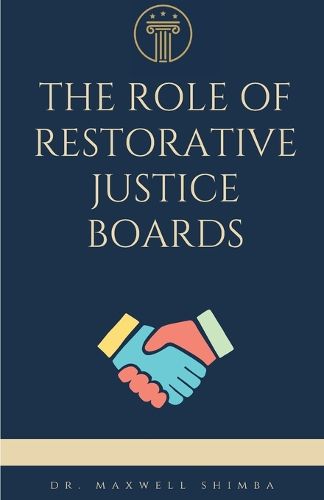Readings Newsletter
Become a Readings Member to make your shopping experience even easier.
Sign in or sign up for free!
You’re not far away from qualifying for FREE standard shipping within Australia
You’ve qualified for FREE standard shipping within Australia
The cart is loading…






This title is printed to order. This book may have been self-published. If so, we cannot guarantee the quality of the content. In the main most books will have gone through the editing process however some may not. We therefore suggest that you be aware of this before ordering this book. If in doubt check either the author or publisher’s details as we are unable to accept any returns unless they are faulty. Please contact us if you have any questions.
The Role of Restorative Justice Boards
The Role of Restorative Justice Boards by Dr. Maxwell Shimba offers an in-depth exploration of how restorative justice is reshaping modern criminal justice practices. In this insightful book, Dr. Shimba delves into the essential function of restorative justice boards in bridging the gap between victims, offenders, and the community. Rather than focusing solely on punishment, restorative justice prioritizes healing, accountability, and rehabilitation, fostering dialogue between all parties involved in a crime. The book emphasizes how these boards facilitate conversations that allow victims to express their pain, offenders to take responsibility, and communities to support reconciliation and reintegration.
Dr. Shimba highlights the transformative power of restorative justice through real-life examples, showing how these processes can reduce recidivism, empower victims, and promote offender rehabilitation. The book examines various restorative justice practices, such as victim-offender mediation, community service, and restitution agreements, all of which provide offenders with opportunities to make amends and repair the harm they caused. By focusing on the human impact of crime and fostering mutual understanding, restorative justice offers a more compassionate and effective approach to resolving conflict compared to traditional punitive measures.
In addition to outlining the strengths of restorative justice, Dr. Shimba also addresses the challenges and criticisms it faces, including skepticism from traditional justice systems and concerns about its emotional demands. He provides thoughtful responses to these critiques, demonstrating how restorative justice can be adapted and integrated into broader legal frameworks to ensure its effectiveness and sustainability. The Role of Restorative Justice Boards is a must-read for anyone interested in criminal justice reform, community healing, or alternative approaches to conflict resolution. Dr. Shimba's work serves as a compelling case for the widespread adoption of restorative justice as a means of creating a more just and empathetic society.
$9.00 standard shipping within Australia
FREE standard shipping within Australia for orders over $100.00
Express & International shipping calculated at checkout
This title is printed to order. This book may have been self-published. If so, we cannot guarantee the quality of the content. In the main most books will have gone through the editing process however some may not. We therefore suggest that you be aware of this before ordering this book. If in doubt check either the author or publisher’s details as we are unable to accept any returns unless they are faulty. Please contact us if you have any questions.
The Role of Restorative Justice Boards
The Role of Restorative Justice Boards by Dr. Maxwell Shimba offers an in-depth exploration of how restorative justice is reshaping modern criminal justice practices. In this insightful book, Dr. Shimba delves into the essential function of restorative justice boards in bridging the gap between victims, offenders, and the community. Rather than focusing solely on punishment, restorative justice prioritizes healing, accountability, and rehabilitation, fostering dialogue between all parties involved in a crime. The book emphasizes how these boards facilitate conversations that allow victims to express their pain, offenders to take responsibility, and communities to support reconciliation and reintegration.
Dr. Shimba highlights the transformative power of restorative justice through real-life examples, showing how these processes can reduce recidivism, empower victims, and promote offender rehabilitation. The book examines various restorative justice practices, such as victim-offender mediation, community service, and restitution agreements, all of which provide offenders with opportunities to make amends and repair the harm they caused. By focusing on the human impact of crime and fostering mutual understanding, restorative justice offers a more compassionate and effective approach to resolving conflict compared to traditional punitive measures.
In addition to outlining the strengths of restorative justice, Dr. Shimba also addresses the challenges and criticisms it faces, including skepticism from traditional justice systems and concerns about its emotional demands. He provides thoughtful responses to these critiques, demonstrating how restorative justice can be adapted and integrated into broader legal frameworks to ensure its effectiveness and sustainability. The Role of Restorative Justice Boards is a must-read for anyone interested in criminal justice reform, community healing, or alternative approaches to conflict resolution. Dr. Shimba's work serves as a compelling case for the widespread adoption of restorative justice as a means of creating a more just and empathetic society.